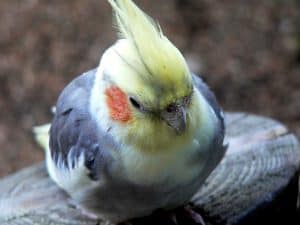Imagine settling down for the night only to be startled by the panicked flapping of wings. If you’re a cockatiel owner, you might be all too familiar with the heart-wrenching sound of your feathered friend experiencing what’s known as a night fright. These incidents can be distressing for both you and your pet, but thankfully, coping with cockatiel night frights isn’t as daunting as it might seem.
Understanding what triggers these frights is the first step. Factors like sudden noises or light changes can send your cockatiel into a frenzy. By making a few adjustments to their sleeping environment, you can help minimize these scares and ensure a peaceful night for both of you.
In the following sections, you’ll discover practical tips and strategies to prevent these nocturnal disturbances, helping your cockatiel feel safer and more secure when the lights go out. Let’s explore how you can create a calm, comforting nighttime routine for your pet.
Understanding Cockatiel Night Frights

Common Triggers of Night Frights
Night frights in cockatiels often stem from their natural instincts as prey animals. These instincts, honed through generations of survival in the wild, can be triggered by several environmental factors. One major factor is sudden changes in lighting, such as the flash of headlights or a sharp contrast between darkness and bright lights. Even a new night light installed in the room can surprise your cockatiel and evoke their instinctual responses.
Unexpected noises can also set off night frights, whether they come from household pets, TV static, or the calls of other bird species outside. The sounds of wild birds outside, particularly those that are perceived as potential predators, can provoke a fear response in captive cockatiels. Additionally, modifications to their familiar surroundings, like a new painting or rearranging the room, can unsettle them, triggering a similar response.
Understanding these triggers is crucial for making necessary environmental adjustments to help your cockatiel feel secure and comfortable. Providing your bird with enough space to move freely and ensuring their cage setup promotes a sense of security are essential steps in preventing night frights. Regular physical examinations by an avian vet can also help ensure there are no underlying health issues contributing to disturbed behavior during the night.
What Happens During a Night Fright?
During a night fright, cockatiels experience a burst of acute stress. They might suddenly start thrashing around their cage, which could lead to possible injuries or even severe harm if blood feathers are broken. Blood feathers, which are actively growing feathers with a blood supply running through them, are particularly vulnerable during these frantic movements. If a blood feather is broken, it can result in bleeding and discomfort for your bird.
The bird’s frantic movements as it tries to escape perceived threats often involve flapping violently, leading to feathers getting caught or damage to the cage bars. These night fright episodes not only cause stress to your bird but might also elevate their risk of a calcium deficiency if not addressed.
Maintaining a consistent and calming bedtime routine can help temper these incidents. Employing soothing techniques such as playing white noise or soft music, and using breathable fabric to cover the cage, can also contribute significantly to reducing stress. Regularly assessing your cockatiel’s condition and making any necessary adjustments in their night cage setup can help mitigate night frights, ensuring your bird receives adequate sleep and remains safe from harm.
How to Calm a Cockatiel During Night Frights

Immediate Steps to Take
When your cockatiel experiences a night fright, quick action mitigates stress and prevents possible injuries. Firstly, gently talk softly to reassure your bird with your calm and familiar voice. If it’s safe to approach, you can partially cover the cage with a breathable fabric to reduce visual stimuli without completely blocking airflow. Ensure any light in the room isn’t too bright, as dim lighting simulates dusk and can help soothe your bird. Additionally, turning on some white noise or soft music might mask sudden noises that could trigger further panic. Check the cage floor and perches for any loose items that could cause harm, securing any blood feathers that might have been dislodged during the fright.
Long-Term Solutions for Stress Reduction
To prevent night frights and ensure your cockatiel’s overall well-being, routine establishment and environmental adjustments are crucial. Start by maintaining a consistent bed time routine that prepares your bird for a night of adequate sleep, such as dimming the lights at the same time each evening and providing a quiet hour before sleep. Regular physical examinations by an avian vet can rule out any underlying health issues contributing to stress or hormonal behavior.
Optimizing the cage setup is essential too; the cage should offer enough space and be placed in a part of the house that minimizes disturbances during the night. Adding a night cage in a separate, quieter room could also be beneficial, especially if you own other birds or pets that may disrupt your cockatiel’s sleep. Address any changes in the bird’s environment slowly—introducing new items such as toys or changing the cage’s location or bird room should be done gradually to allow your cockatiel to adapt without stress.
- It is specially designed for large cage that has "play top" on top of the cage. It is for 22"x24x68 large cage.
- Easy to assemble/disassemble, magnetic buckle is used to mount on the cage, which makes installation easy and quick.
- Breathable materials 100% non-toxic with high shading rate.
- Effectively reduce distractions so to promote better sleep for birds.
- Large size, Cover size is 41(H* 104 (L) only for the 68" cage with the play top.
- 100% SATISFACTION GUARANTEE: one-year warranty. You are sure to get 100% quality products as we stand behind our products. Please contact us for any issues.
Preventative Measures to Reduce Night Frights
Optimizing the Cage Environment
To effectively prevent night frights in your cockatiel, optimizing the cage environment is crucial. Ensure the cage is spacious enough to allow your bird to move freely without feeling cramped. This helps in maintaining not only the physical but also the mental health of your feathered friend, reducing stress and anxiety that might trigger night frights. Install a night light in the room to provide a gentle glow, mimicking moonlight and minimizing startling shadows or sudden changes in light which could scare your bird during the night.
Moreover, check for any cage bars that might be loose or broken as these could cause possible injuries. Lastly, placing the cage in a part of your home that’s free from noisy household activities, especially during the night, can immensely help in keeping your cockatiel calm and secure.
The Importance of Consistent Routine
Establishing a consistent routine is key to coping with cockatiel night frights. Try to maintain a regular schedule for feeding, playtime, and most importantly, bed time. This consistency helps your cockatiel to understand and anticipate what to expect, which greatly reduces stress and anxiety levels. About 30 minutes before bed time, engage in quiet and calming interactions to help your bird wind down. Use a soft, breathable fabric to cover the cage at night, ensuring it’s dark enough inside yet airy. Additionally, introducing soothing background noises like white noise can mask other disruptive sounds.
Handling Injuries from Night Frights

First Aid for Minor Injuries
If your cockatiel experiences night frights, you’ll sometimes need to administer first aid for minor injuries such as scrapes or light feather damage. Having a first aid kit prepped and near the cage ensures you’re ready to care for your bird effectively. Include items like styptic powder to stop minor bleeding, especially for damage to blood feathers, saline solution for cleaning wounds, and soothing aloe vera gel for any skin irritations. Remember, calmly handling your bird during first aid application reduces stress, allowing easier recovery.
Administering first aid promptly mitigates worse outcomes, and prevents small injuries from developing into serious conditions. Set a calm atmosphere, lightly dim the room light, and speak in soft tones to your cockatiel while administering treatment. This approach not only eases your bird’s anxiety but also fostifies a sense of security and trust during these vulnerable moments.
When to Consult a Veterinarian
Cockatiel injuries from night frights, while often minor, can sometimes indicate underlying health issues requiring professional attention. Consult an avian veterinarian if injuries are persistent, if there’s significant blood loss or if your cockatiel shows signs of disorientation or weakness post-injury. A professional can perform a comprehensive physical examination to rule out or confirm any conditions and discuss further steps.
If you suspect the injuries involve deep tissue, or if your bird’s behavior remains altered long after the fright incident, seeking a vet consultation ensures proper care. Avian experts can also offer guidance on environmental adjustments and routine establishment to help manage and prevent night frights long-term. They can explore the root cause, possibly suggesting changes like installing thicker curtains or using a night cage designed to keep your pet birds calm and safe throughout the night.
Final Thoughts: Coping with Cockatiel Night Frights
Coping with your cockatiel’s night frights effectively means being proactive and prepared. By fine-tuning their environment and sticking to a soothing bedtime routine you’re setting the stage for peaceful nights. Remember it’s crucial to have a first aid kit handy for any unexpected incidents. Should injuries occur stay calm and provide the necessary care promptly. If issues persist don’t hesitate to consult with a vet to ensure your feathered friend’s health and well-being. With these strategies you’ll not only manage these scary episodes but also enhance the quality of life for your beloved bird.




